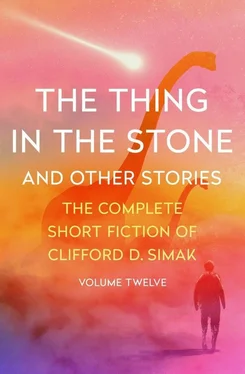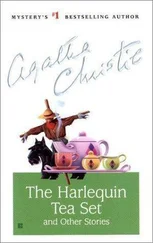Then suddenly they felt the power of the brain slipping, felt its strength falter and ebb. They had beaten it!
They sensed the gigantic struggle going on in that great brain, the struggle to regain the grip it had lost.
For years on end it had lived without struggle, without question that it was the ruler of the earth. They sensed the futile anger and the devastating fear which revolved in the convolutions of Golan-Kirt.
But he was beaten, beaten at last by men from out of a forgotten age. He had met defeat at the hands of ridicule, something he had never known, a thing he had not suspected.
His strength ebbed steadily. The twentieth century men felt his dread power lift from them, sensed the despair which surged through him.
They stopped their laughter, their sides sore, their throats hoarse. Then they heard. The arena resounded with laughter. The crowd was laughing. The horrible uproar beat like a tumult upon them. The future-men were roaring, bent over, stamping their feet, throwing back their heads, screaming to the murky skies. They were laughing at Golan-Kirt, screaming insults at him, hooting him. It was the end of his rule.
For generations the future-men had hated him with the very hate he had taught them. They had hated and feared. Now they feared no longer and hate rode unchained.
From a god he had fallen to the estate of a ridiculous fraud. He was a thing of pity, an uncloaked clown, simply a naked, defenseless brain that had bluffed its way through centuries of kingship.
Through bleared eyes the twentieth century men saw the great brain, writhing now under the scorn of its erstwhile subjects, being laughed powerless. No long did it hold control over these creatures of a dying world. Its close-set eyes glowed fiercely, its beak clicked angrily. It was tired, too tired to regain its rule. It was the end of Golan-Kirt!
The revolvers of the time-travelers came up almost simultaneously. This time the sights lined on the brain. There was no power to ward off the danger.
The guns roared rapidly, spitting hateful fire. At the impact of the bullets the brain turned over in the air, blood spurted from it, great gashes appeared in it. With a thump it struck the ground, quivered and lay still.
The time-travelers, their eyes closing from sheer weariness, their knees suddenly weak, slumped to the sand, the .45’s still smoking.
Over the arena floated the full-toned roar of the future-men.
“Hail to the Deliverers! Golan-Kirt is dead! His rule is ended! Hail to the saviors of the race!”
“It is impossible to reverse time. You cannot travel back to your own age. I have no idea of what will occur if you attempt it, but I do know it is impossible. We of this age knew travel into the future was possible, but we lacked the technique to build a machine to try it. Under the rule of Golan-Kirt there was no material progress, only a steady degeneration. We know that it is impossible to reverse time. We, as a people, beg you not to attempt it.”
Old Agnar Nohl, his white beard streaming in the wind, his hair flying, spoke seriously. There was a troubled frown on his face.
“We love you,” he went on, “you freed us of the tyranny of the brain which ruled over us for uncounted time. We need you. Stay with us, help us rebuild this land, help us construct machines, give us some of the marvelous knowledge which we, as a race, have lost. We can give you much in return, for we have not forgotten all of the science we knew before the coming of Golan-Kirt.”
Harl shook his head.
“We must at least try to go back,” he said.
The two twentieth century men stood beside the plane. Before them was a solid mass of humanity, a silent humanity in the shadow of the silent ruins of the city of Denver, the future-men who had come to bid the time-travelers a regretful farewell.
A chill wind howled over the desert, carrying its freight of sand. The furs of the future-men fluttered in the gale as it played a solemn dirge between the ruined walls of humbled buildings.
“If there was a chance of your success, we would speed you on your way,” said old Agnar, “but we are reluctant to let you go to what may be your death. We are selfish enough to wish to hold you for ourselves, but we love you enough to let you go. You taught us hate was wrong, you removed the hate that ruled us. We wish only the best for you.
“It is impossible to go back in time. Why not remain? We need you badly. Our land grows less and less food every year. We must discover how to make synthetic food or we shall starve. This is only one of our problems. There are many others. You cannot go back. Stay and help us!”
Again Harl shook his head.
“No, we must try it. We may fail, but we must try it at least. If we succeed we shall return and bring with us books of knowledge and tools to work with.”
Agnar combed his beard with skinny fingers.
“You’ll fail,” he said.
“But if we don’t we will return,” said Bill.
“Yes, if you don’t,” replied the old man.
“We are going now,” said Bill. “We thank you for your thoughtfulness. We must at least try. We are sorry to leave you. Please believe that.”
“I do believe it,” cried the old man and he seized their hands in a farewell clasp.
Harl opened the door of the plane and Bill clambered in.
At the door Harl stood with upraised hand.
“Good-bye,” he said. “Someday we will return.”
The crowd burst into a roar of farewell. Harl climbed into the plane and closed the door.
The motors bellowed, droning out the shouting of the future-men and the great machine charged down the sand. With a rush it took the air. Three times Bill circled the ruined city in a last mute good-bye to the men who watched silently and sorrowfully below.
Then Harl threw the lever. Again the utter darkness, the feeling of hanging in nothingness.
The motors, barely turning, muttered at the change. A minute passed, two minutes.
“Who says we can’t travel back in time!” Harl shouted triumphantly. He pointed to the needle. It was slowly creeping back across the face of the dial.
“Maybe the old man was wrong after—”
Bill never finished the sentence.
“Roll her out,” he screamed at Harl, “roll her out. One of our engines is going dead!”
Harl snatched at the lever, jerked frantically at it. The faulty motor choked and coughed, sputtered, then broke into a steady drone.
The two men in the cabin regarded one another with blanched faces. They knew they had escaped a possible crash—and death—by bare seconds.
Again they hung in the air. Again they saw the brick-red sun, the desert, and the sea. Below them loomed the ruins of Denver.
“We couldn’t have gone far back in time,” said Harl. “It looks the same as ever.”
They circled the ruins.
“We had better land out in the desert to fix up the engine,” suggested Harl. “Remember we have traveled back in time and Golan-Kirt still rules over the land. We don’t want to have to kill him a second time. We might not be able to do it.”
The plane was flying low and he nosed it up. Again the faulty engine sputtered and missed.
“She’s going dead this time for certain,” yelled Bill. “We’ll have to chance it, Harl. We have to land and chance getting away again.”
Harl nodded grimly.
Before them lay the broad expanse of the arena. It was either that or crash.
As Bill nosed the plane down the missing motor sputtered for the last time, went dead.
They flashed over the white walls of the amphitheater and down into the arena. The plane struck the sand, raced across it, slowed to a stop.
Harl opened the door.
“Our only chance is to fix it up in a hurry and get out of here,” he shouted at Bill. “We don’t want to meet that damn brain again.”
Читать дальше












